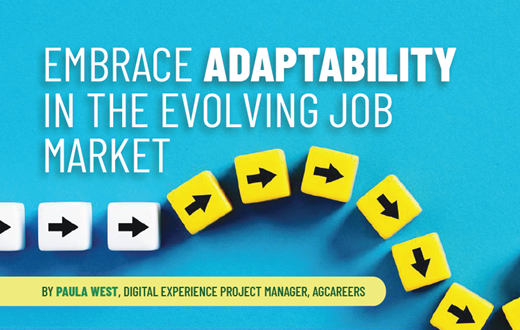- Candidates
- Login
- Set Up Account
- Create a Job Alert
- Search Tools
- Resources
- Employers

Adaptability is crucial as the job market constantly evolves; being flexible and open to learning new skills will make you stand out.
Expectations may clash with workplace realities, so adaptability is critical for career success. Today's job market is dynamic, shaped by shifting technologies, economic uncertainty, hybrid work models, and evolving expectations from employers. Thriving in this environment requires more than technical knowledge; it demands the ability to adapt.
What Is Adaptability?
Adaptability is the ability to adjust to new conditions, pivot when faced with unexpected challenges, and stay productive during transitions. It involves being flexible, resilient, and proactive in the face of change.
Adaptability isn't about going with the flow mindlessly; it's about responding strategically to change, learning from it, and positioning yourself to succeed in new environments.
The business landscape constantly evolves, driven by emerging technologies, shifting customer expectations, and changing company priorities. Adaptability allows you to cope with change and thrive in it. Instead of resisting change, adaptable employees approach it with a positive attitude, ready to learn and grow. This attitude is particularly crucial in positions where priorities frequently shift, or innovation plays a vital role.
Problem-Solving and Innovation
Adaptable employees are often better problem solvers. When plans fall through or unexpected challenges arise, they adjust quickly and seek creative solutions. Adjustments may involve collaborating with other departments, experimenting with new processes, or acquiring new skills. Be solution-oriented, not reactive.
When things don't go as planned, adaptability helps you to think on your feet and find solutions. Whether you're resolving conflict, learning new software, or adjusting to a team restructure, adaptable employees are more resourceful and innovative in finding ways to move forward. Resourcefulness may involve reaching out to colleagues you don't usually work with, asking other departments for input, or presenting new ideas to improve workflow. These efforts might involve taking on new tasks to improve processes, test efficiencies, or propose workflow changes.
Workplaces often face uncertainty, such as shifting goals, unexpected setbacks, or new priorities. Adaptable employees excel in uncertain situations, quickly adjusting while maintaining high productivity and morale. Their ability to remain calm and focused during uncertain times helps the team stay aligned and motivated.
Being adaptable helps you become more resilient in the face of challenges. Instead of becoming frustrated or overwhelmed by obstacles, adaptable people see them as opportunities to gain experience and grow. This mindset enables them to bounce back quickly and perform well under pressure.
Adaptability in Action
Here's how adaptability shows up in everyday work:
Continuous Learning
Adaptability is a mindset of continuous learning and growth. It involves staying curious and up-to-date with new tools, trends, and practices in your field.
Being willing to learn and try new things will help you grow professionally and remain valuable, regardless of how the industry or company evolves. Continuous learning can include taking courses, reading books, or listening to podcasts to stay aware and adapt to changes in the workplace. Workplaces are increasingly relying on technology, and new platforms emerge all the time. From automation and project management tools to AI-assisted workflows, being comfortable with learning digital tools is a core part of adaptability. Continuous learning highlights you as a valuable employee and opens doors to new roles or responsibilities.
Adaptability requires more than behavior; it's also about how you emotionally process change. Staying calm, recognizing your reactions, and empathizing with others can reduce stress and build stronger, more collaborative teams.
The job market constantly evolves, with new roles, industries, and skill sets emerging. Adaptability enables you to adjust your career focus, acquire new competencies, and assume new responsibilities to remain relevant and grow.
Strengthening Your Professional Relationships
Adaptability often involves working with diverse teams, new personalities, and different management styles. Being flexible and open-minded in these situations fosters stronger relationships and better collaboration. Adaptable employees are more likely to build trust, respect, and rapport with colleagues and leaders.
Employers also value employees who can adapt to new roles, market changes, or shifting priorities. Demonstrating adaptability often leads to career growth and new opportunities, as it shows you can thrive in dynamic environments and handle diverse tasks and responsibilities.
How to Be More Adaptable:
Many early-career professionals prioritize flexibility, but not all roles can offer it immediately. One student shared, "I thought I'd be able to work from anywhere after graduating, but during interviews, I learned the job required full-time office hours for training."
Instead of being discouraged, reframe the early stage of your career as an investment:
"Flexibility can be a major perk, but gaining experience, proving reliability, and building workplace relationships may unlock even more freedom in the long run."
Adaptability means recognizing that flexibility often comes after you've built trust and demonstrated value.
Adaptability isn't just a workplace buzzword; it's a mindset that helps you grow, lead, and thrive in a world that rarely stands still. Being adaptable means staying open to change, learning continuously, and turning uncertainty into opportunity, whether you're just starting or pivoting mid-career.
Stand out as a resilient, resourceful professional and unlock new levels of growth and fulfillment. Take advantage of the career resources and job opportunities now at www.AgCareers.com.